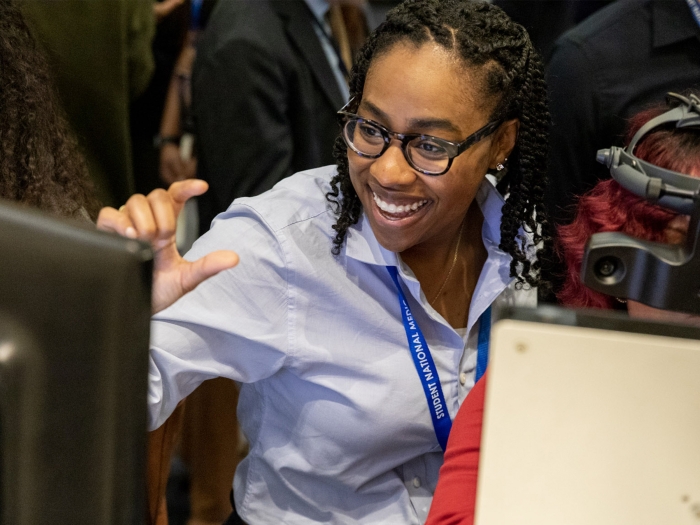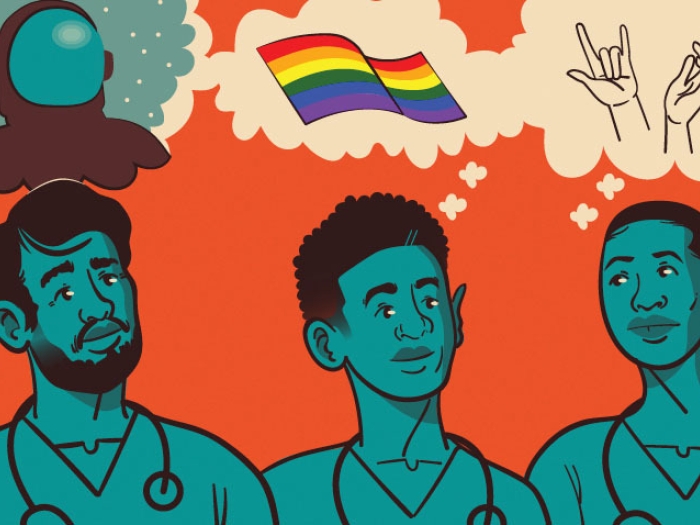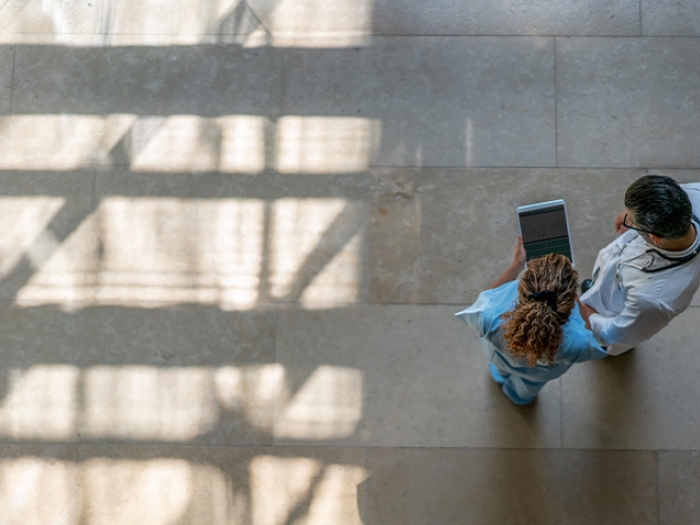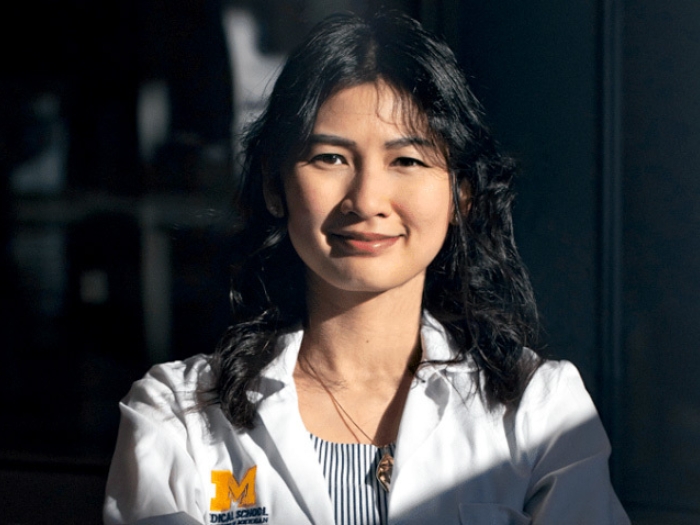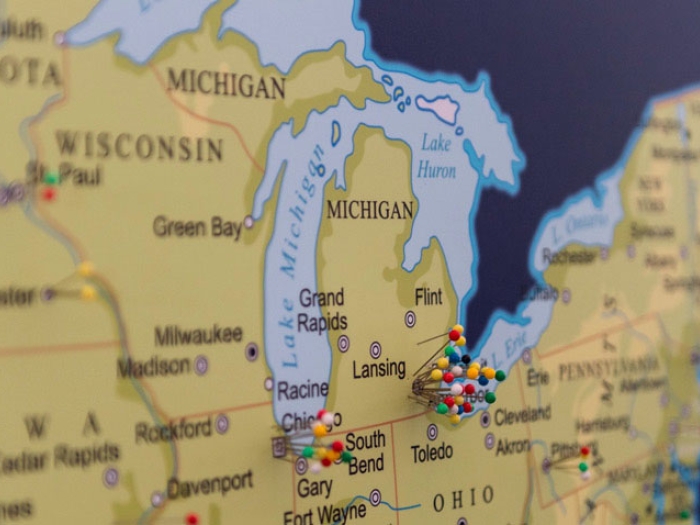Health sciences students at U-M engage in non-traditional, interactive learning that focuses on interprofessional communication.
12:43 PM
Author |
By working together, overcoming differences, and focusing on common values, goals and outcomes, health sciences students from all three campuses of the University of Michigan are collaborating to improve future health outcomes.
Through the Michigan Center for Interprofessional Education, students from U-M's broad range of health-related schools and colleges, including medicine, dentistry, nursing, pharmacy and public health, are provided with opportunities to work "interprofessionally" with one another.
"Students who come to Michigan expect that the values of teamwork, interdisciplinary learning and patient care are front and center in their educational experiences," says Rajesh Mangrulkar, M.D., associate dean for medical student education, including interprofessional education, at the University of Michigan Medical School.
LISTEN UP: Add the new Michigan Medicine News Break to your Alexa-enabled device, or subscribe to our daily updates on iTunes, Google Play and Stitcher.
"That is exactly what our IPE movement has begun to build here, and the excitement this has generated among our applicants over the past couple of years is palpable."
A change in culture
Historically, education for aspiring health professionals has been delivered in "uni-disciplinary" ways, occurring in separate, often isolated silos by a team of individual experts. However, as health care delivery continues to evolve to meet patient and population health needs, educators have found that this approach is no longer sufficient.
"This initiative focuses on several core competencies that include values and ethics, roles and responsibilities, communication, teamwork and intercultural intelligence," says Vani Patterson, assistant director of the Michigan Center for Interprofessional Education, who received her MPH at U-M. "It also provides students with diverse learning opportunities outside of the traditional semester-based courses, like clinical and field experiences, service learning projects, simulations and online modules."
The program is divided into levels of progression, which aim to measure IPE competency for students participating in the curriculum. It starts with exposure, which is an introduction to the material, and ends with mastery of the practice.
They'll also learn about new student perspectives, as well as the roles and contributions of other professions when it comes to patient care and advanced critical thinking skills.
"Students are encouraged to gain a deeper understanding of their own future professions while gaining a preliminary appreciation of different worldviews and the roles of other professions," says Patterson. "These types of real-life interactions are so important in preparing students to work on a team and provide the best possible care."
Students who come to Michigan expect that the values of teamwork, interdisciplinary learning and patient care are front and center in their educational experiences.Rajesh Mangrulkar, M.D.
IPE in Action
Students are first introduced to IPE through an online course immediately followed by a large collaborative event called IPE in Action, which takes place at Crisler Center. Each participating team of students discusses a complex patient case at roundtables facilitated by faculty members.
Over 1,100 students from U-M's health sciences schools on the Ann Arbor, Flint and Dearborn campuses will attend this year's event as a part of their regular courses within their respective programs.
Data indicates that student knowledge of and attitudes towards their fellow health sciences programs significantly improves after completing the introductory IPE online course and participating in the IPE in Action event.
MORE FROM MICHIGAN: Sign up for our weekly newsletter
"We know that institutions like the World Health Organization recognize the importance of IPE for the success of students pursuing careers in health sciences," says Tony Denton, J.D., MHSA, senior vice president and chief operating officer for the University of Michigan Health System, who will serve as this year's keynote speaker. "This initiative provides our students with a platform to effectively communicate with each other when problem-solving, and also prepares them to enter the ever-evolving world of health care by being a part of a collaborative practice team."
In addition, all third-year dental and pharmacy students, advanced-practice nursing students, first-year medical students and first-year social-work students in the Integrated Health Scholars, Detroit Clinical Scholars and Health Resources and Services Administration Scholars programs are now required to participate in Team-Based Clinical Decision Making (TBCDM).
And according to Patterson, this helps prepare students for future professional success: "The foundational experience sets the groundwork for more intense IPE experiences, like TBCDM, which allows students to really dive deep into the IPE competencies in a safe environment before having to practice them in their rotations."
As innovators in the world of IPE, U-M faculty and staff are presenting their findings related to the foundational experience and other IPE innovations at several interprofessional conferences in 2019, including the Midwest Interprofessional Practice, Education, and Research Center conference and the Collaborating Across Borders international conference.
"I think we all work together to solve problems better for our patients when we embrace each other's diverse perspectives and skills, so that's really what this is about – getting students from the beginning used to doing that, and that learning will only lay an incredible foundation for them to continue to work together," says Mangrulkar. "Whether it be on clinical care or research projects, or even education, bringing them together and learning how to do that from day one, is essential for the work that we do."
This year's IPE in Action event is on October 16 at Crisler Center. For more information about IPE at U-M, click here.

Explore a variety of healthcare news & stories by visiting the Health Lab home page for more articles.

Department of Communication at Michigan Medicine
Want top health & research news weekly? Sign up for Health Lab’s newsletters today!
